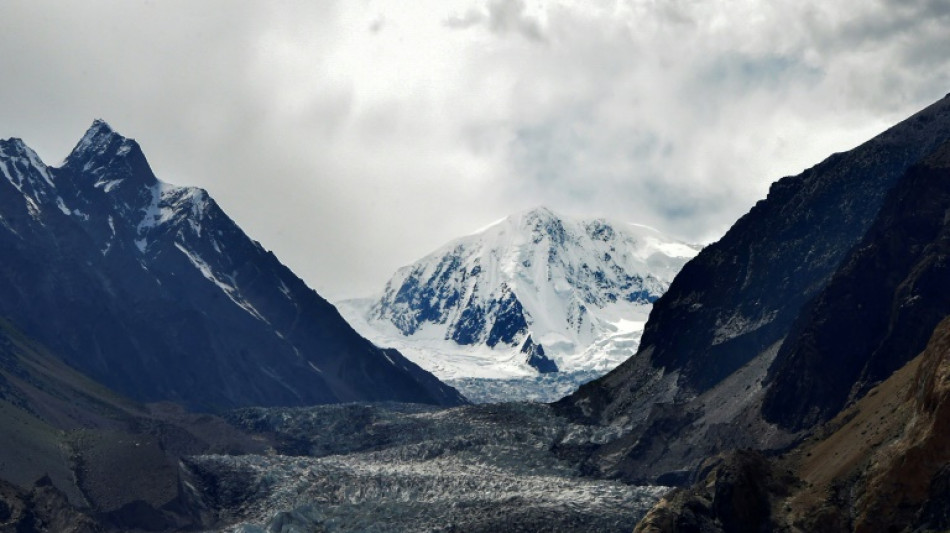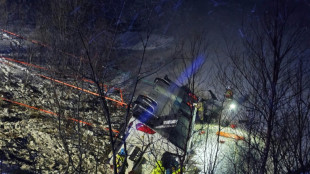
-
 Smith century puts Australia in control of 4th Test against India
Smith century puts Australia in control of 4th Test against India
-
Israeli strikes hit Yemen as Netanyahu fires warning

-
 Peru ex-official denies running Congress prostitution ring
Peru ex-official denies running Congress prostitution ring
-
Australia's Smith reaches 34th Test century

-
 NHL Red Wings fire Lalonde and name McLellan as head coach
NHL Red Wings fire Lalonde and name McLellan as head coach
-
Injured Halep withdraws from Australian Open

-
 Liverpool power seven points clear, Man Utd crash at Wolves
Liverpool power seven points clear, Man Utd crash at Wolves
-
Leaders Liverpool survive Leicester scare to go seven points clear

-
 Membership of UK's anti-immigration Reform party surpasses Conservatives
Membership of UK's anti-immigration Reform party surpasses Conservatives
-
Two dead in treacherous Sydney-Hobart yacht race

-
 Amorim warns of 'long journey' ahead for miserable Man Utd
Amorim warns of 'long journey' ahead for miserable Man Utd
-
Three dead, four injured in Norway bus accident

-
 Man Utd fall to Wolves as Fernandes sees red
Man Utd fall to Wolves as Fernandes sees red
-
Fernandes sent off as Man Utd crash at Wolves, troubled Man City held by Everton

-
 'Logical' that fatigued Spurs are faltering - Postecoglou
'Logical' that fatigued Spurs are faltering - Postecoglou
-
Manmohan Singh: technocrat who became India's accidental PM

-
 India's former PM Manmohan Singh dies aged 92
India's former PM Manmohan Singh dies aged 92
-
Acid risk contained in deadly Brazil bridge collapse

-
 Chelsea stunned by Fulham in blow to Premier League title hopes
Chelsea stunned by Fulham in blow to Premier League title hopes
-
Troubled Man City held by lowly Everton, Chelsea title bid rocked

-
 Paterson, Bosch give South Africa edge over Pakistan in first Test
Paterson, Bosch give South Africa edge over Pakistan in first Test
-
Oil leak in Peru tourist zone triggers 'environmental emergency'

-
 Mozambique post-election violence kills 125 in three days: NGO
Mozambique post-election violence kills 125 in three days: NGO
-
Finns probing ship from Russia for 'sabotage' of cables

-
 Williams hits unbeaten 145 as Zimbabwe make Afghanistan toil
Williams hits unbeaten 145 as Zimbabwe make Afghanistan toil
-
Bowlers bring Pakistan back into first Test in South Africa

-
 Banbridge foils French to land King George VI Chase for Ireland
Banbridge foils French to land King George VI Chase for Ireland
-
Man City pay penalty for Haaland miss in Everton draw

-
 Paterson takes five wickets as Pakistan bowled out for 211
Paterson takes five wickets as Pakistan bowled out for 211
-
Kremlin cautions on 'hypotheses' over plane crash

-
 Pakistan military convicts 60 more civilians of pro-Khan unrest
Pakistan military convicts 60 more civilians of pro-Khan unrest
-
Turkey lowers interest rate to 47.5 percent

-
 Syria authorities launch operation in Assad stronghold
Syria authorities launch operation in Assad stronghold
-
Record number of migrants lost at sea bound for Spain in 2024: NGO

-
 Kohli called out over shoulder bump with Konstas during fourth Test
Kohli called out over shoulder bump with Konstas during fourth Test
-
Rural communities urged to flee east Australia bushfire

-
 Sri Lanka train memorial honours tsunami tragedy
Sri Lanka train memorial honours tsunami tragedy
-
S. Korea's opposition moves to impeach acting president

-
 'We couldn't find their bodies': Indonesian tsunami survivors mourn the dead
'We couldn't find their bodies': Indonesian tsunami survivors mourn the dead
-
Lakers pip Warriors after another LeBron-Curry classic

-
 India readies for 400 million pilgrims at mammoth festival
India readies for 400 million pilgrims at mammoth festival
-
Nepal hosts hot air balloon festival

-
 Asia stocks up as 'Santa Rally' persists
Asia stocks up as 'Santa Rally' persists
-
Tears, prayers as Asia mourns tsunami dead 20 years on

-
 Sydney-Hobart yacht crews set off on gale-threatened race
Sydney-Hobart yacht crews set off on gale-threatened race
-
Key public service makes quiet return in Gaza

-
 Fearless Konstas slams 60 as Australia take upper hand against India
Fearless Konstas slams 60 as Australia take upper hand against India
-
Hungry Sabalenka ready for more Slam success

-
 Mass jailbreak in Mozambique amid post-election unrest
Mass jailbreak in Mozambique amid post-election unrest
-
Bridges outduels Wembanyama as Knicks beat Spurs


Himalayan glaciers melting 65 percent faster than previous decade: study
Himalayan glaciers providing critical water to nearly two billion people are melting faster than ever before due to climate change, exposing communities to unpredictable and costly disasters, scientists warned Tuesday.
The glaciers disappeared 65 percent faster from 2011 to 2020 compared with the previous decade, according to a report by the International Centre for Integrated Mountain Development (ICIMOD).
"As it gets warmer, ice will melt, that was expected, but what is unexpected and very worrying is the speed," lead author Philippus Wester told AFP. "This is going much faster than we thought."
Glaciers in the Hindu Kush Himalaya (HKH) region are a crucial water source for around 240 million people in the mountainous regions, as well as for another 1.65 billion people in the river valleys below, the report said.
Based on current emissions trajectories, the glaciers could lose up to 80 percent of their current volume by the end of the century, said the Nepal-based ICIMOD, an inter-governmental organisation that also includes member countries Afghanistan, Bangladesh, Bhutan, China, India, Myanmar and Pakistan.
The glaciers feed 10 of the world's most important river systems, including the Ganges, Indus, Yellow, Mekong and Irrawaddy, and directly or indirectly supply billions of people with food, energy, clean air and income.
"With two billion people in Asia reliant on the water that glaciers and snow here hold, the consequences of losing this cryosphere (a frozen zone) are too vast to contemplate," said ICIMOD's deputy chief Izabella Koziell.
- 'Too vast to contemplate' -
Even if global warming is limited to the 1.5 to 2.0 degrees Celsius from pre-industrial levels agreed to in the Paris climate treaty, the glaciers are expected to lose a third to a half of their volume by 2100, the peer-reviewed report said.
"It underscores the need for urgent climate action," Wester said. "Every small increment will have huge impacts and we really, really need to work on climate mitigation... that is our plea."
Wester said improving technologies and previously classified high-resolution satellite imagery meant predictions could be made with a good degree of accuracy.
The world has warmed an average of nearly 1.2 C since the mid-1800s, unleashing a cascade of extreme weather, including more intense heatwaves, more severe droughts and storms made more ferocious by rising seas.
Hardest hit are the most vulnerable people and the world's poorest countries, which have done little to contribute to the fossil fuel emissions that drive up temperatures
Amina Maharjan, a livelihoods and migration specialist at ICIMOD, said communities do not have the support they need.
"Most of the adaptation is communities and households reacting (to climate events). It is inadequate to meet the challenges posed by climate change," Maharjan said.
"What is going to be very critical moving forward is anticipating change," she said.
S.Caetano--PC



